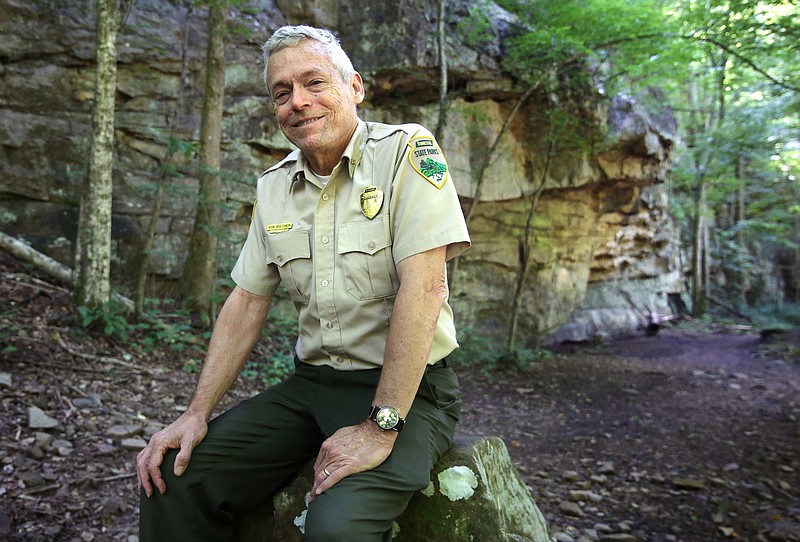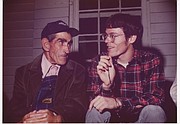Bob Fulcher has been on a victory tour of sorts.
The longtime Tennessee State Parks employee and historian of Tennessee folklore may cringe at the description, but there have been state awards, local recognition, and coming soon, a National Heritage Fellowship - the nation's highest honor in folk and traditional arts.
The banjo-playin', trail-buildin' park manager for the Cumberland Trail State Scenic Trail, which runs through the Chattanooga area, is receiving the spotlight he shone on others for 40 years.
For those four decades, and counting, Fulcher worked for the parks system and met with deeply rooted Tennessee families to listen to their history, mostly through music. These families are the keepers of thousands of ballads of Appalachian music - also known as old-time, folk, banjo or traditional music. Fulcher's hope is the work, much like what he does with the Cumberland Trail, will preserve Tennessee history for future generations. It's what a park should do, he said.
"Knowing the life of everyday people in past generations is often lost," Tennessee Historical Society Executive Director Ann Toplovich said. "We know what famous people ... did, but having [Fulcher's] insight into the daily life of Tennesseans - of people who made it what it is - is very important."
'I fell in love with the music'
Fulcher discovered traditional music before he found an interest in recording the region's history.
He was a child of a military family and moved around the country. He became fascinated by the music as a student at Kentucky's Union College in the 1970s and soon realized much of it would be lost if not properly documented.
So, fresh out of school, and newly hired by Tennessee State Parks, Fulcher set out with a Nagra recorder in 1977 to preserve Tennessee's past.
"I fell in love with the music," he said. "When you meet a traditional musician who has been raised with these pieces of art they may be the only ones who kept it and are carrying something 400 years old that no other family had the stamina to keep."
The Cumberland Trail manager has now documented the history through events, concerts, books, pamphlets, cassettes and more - much of which is available at the Tennessee State Library and Archives in Nashville.
Fulcher helped start a Tennessee State Parks record label to produce the music on CDs. It's believed to be the only state park system with its own record label.
It's all played and discussed on a weekly radio program he hosts every Saturday night on Knoxville's WDVX.
"We don't care if people like it or not," Fulcher said smiling. "We only want them to be reached. It's only beautiful to those who have an ear for beauty."
The money has come in a variety of manners: there's public funding, private grants and other funds given by the Chattanooga-based Lyndhurst Foundation. Fulcher has helped fill more than 50 positions over the years of people documenting folklife and preparing materials for archiving.
He has presented musicians from the region to the Library of Congress, the Smithsonian Institution and the state library. They've played shows at Chattanooga's Tivoli Theatre, Nashville's Performing Arts Center, all nine states in the Southeast and up the East Coast.
"He has really turned up and cultivated some of the most outstanding folk artists in the state who would have otherwise been unknown," said Roby Cogswell, the former folklife program director at the Tennessee Arts Commission.
Fulcher's greatest find, arguably, is the Hicks family of the Cumberland Plateau. The family possesses a collection of a quantity of songs that includes many of the oldest and rarest ever kept in family tradition in the U.S.
"The Hicks family is really incredible," Cogswell said. "In many ways, they're the greatest singing family in American history."
Fulcher agrees it's probably the most important find of his effort, although there are others.
He documented all of Chattanooga old-time fiddler Bob Douglas' roughly 500 tunes "just for kicks." However, the most magnificent story was about the life of Maggie Lee Sayre, Fulcher said. Her story as a deaf woman who lived with her family on a houseboat catching mussels is now documented in a book: "Deaf Maggie Lee Sayre: Photographs of a River Life."
"Maggie's story has the most well-documented tales of houseboat life that we have in America from that time period [in the 20th century]," Fulcher said.
Recognition
Fulcher stood in the middle of Rock/Creek's North Shore store on Wednesday evening surrounded by Chattanoogans who came to hear him speak. It was the latest in a growing list of events in his honor.
The 66-year-old will be awarded the Bess Lomax Hawes National Endowment for the Arts National Heritage Fellowship in Washington, D.C., later this year. It's presented in recognition of an individual who has made a significant contribution to the preservation and awareness of cultural heritage. It is considered the U.S.'s highest honor in folk and traditional arts.
Fulcher has tried to soak it in while he can.
His wife, Teresa, helps manage his schedule. There are guest appearances, his continued efforts to document traditional Tennessee life, and remaining work to be done on the Cumberland Trail. He does as much as he can between an increasing number of doctor appointments to monitor a typically incurable form of blood cancer: multiple myeloma.
"I have a good chance to live for several more years and will have a good time doing it," Fulcher said.
Contact Mark Pace with questions, comments, concerns or story tips at mpace@timesfreepress.com or 423-757-6659. Follow him on Twitter @themarkpace and on Facebook at ChattanoogaOutdoorsTFP.

